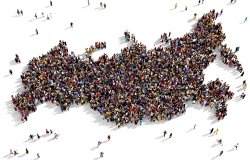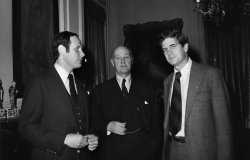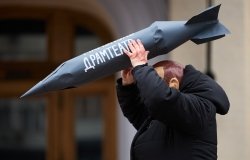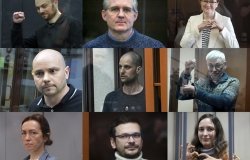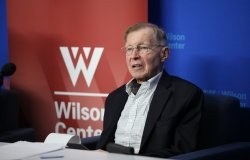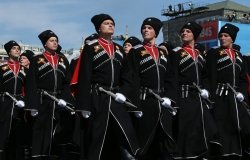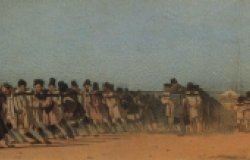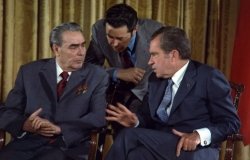Is Russia Entering the Post-Putin Era?
"Are the Russian elites loyal to Putin because he is president, or because he is Putin? I think we are going to find out in the very near future," said Thomas Graham, senior director, Kissinger Associates, and former special assistant to the president and senior director for Russian affairs, National Security Council at a 3 March 2008 lecture. Graham explored possible consequences of the March 2 presidential elections in Russia in three areas: whether President Putin would leave the national stage to his successor; whether the configuration of power in Russia would be different under a President Medvedev; and whether we would see significant policy shifts in Russia under Medvedev.
"Is Putin going to leave the political stage? In a word, no," Graham said. President Putin has given every indication that he is ready to step down from the presidency, but intends to remain on the scene as a dominant political force. During the presidential and recent parliamentary elections, Putin refused to play the role of a lame-duck. He cast the parliamentary election as a referendum on his tenure in office, and his United Russia party won a clear majority of seats. During the presidential campaign, he made policy pronouncements on defense, economics, and foreign policy, promising that candidate Medvedev would "supplement and develop" Putin's ideas. Putin also accepted candidate Medvedev's invitation to serve as prime minister. When asked how long he would serve as prime minister, Graham noted, Putin tellingly responded, "as long as Dmitri Medvedev is president." Constitutionally, the prime minister serves at the pleasure of the president.
Regarding the configuration of power in the post-Putin era, Graham observed that Putin had rebuilt the structure of power along traditional Russian lines: highly centralized and personalized, based on a narrow elite of competing factions, with the President serving as the final arbiter of elite competition. Graham noted that, while most Russian leaders have left the Kremlin dead or discredited, Putin is leaving office voluntarily at the height of his popularity, even though he could have easily had the constitution amended to allow him to run for additional consecutive terms in office. Graham contended that we should therefore at least entertain the possibility that Putin's goal was the creation of a system of shared power between the new president and him as prime minister. Graham questioned whether such a dual-power system could be stable, considering it has been attempted without great success at other times in Russian history. In the short run, Putin will be dominant in the relationship, predicted Graham. However, Medvedev will not be without resources of his own once he takes office.
Graham identified several possible scenarios for the emergence of a more traditionally Russian single-power configuration. First, Medvedev could step down as president, clearing the way for Putin to run again. Second, the Russian structure of power could shift away from the president to the prime minister through constitutional amendments and legislation. Graham asserted that the longer Medvedev is in office, the more difficult for either of these two scenarios to occur. Third, Medvedev could find a way to force Putin from office, perhaps by tainting Putin with some government failure. Fourth, Putin could remain as prime minister only long enough for Medvedev to secure his position as president. Fifth, a stable dual power system with checks and balances could be established, which may be the most hopeful outcome for Russia, Graham suggested. While the chances of creating such a system would appear limited, given Russian history and tradition, it may offer the best chance for a less personalized, more institution-based system of power to emerge.
Whether Russia returns to its traditional power structure, or a new stable dual-power system emerges, Russia will have to undertake policy shifts to address future challenges, Graham said. If the past 10 years were about restoring Russian pride and strength, the next decade will have to refocus Russia's energies from restoration to modernization. To that end, he continued, Russia will require investing hundreds of billions of dollars in infrastructure renewal; rebuilding its public education and health systems; diversifying its economy away from energy and towards hi-tech and services; and addressing the demographic crisis facing Russia.
To succeed in these areas, Graham argued that the Medvedev/Putin administration will have to reduce corruption and increase transparency, and it will need to relax the centralization of power. It will also need to rethink its policy towards the West. Graham asserted that, while Russia has to take the lead in its modernization, it will need Western investment, technology, and know-how to succeed. Moreover, only the United States has the capacity to help Russia meet the full range of its foreign policy and security challenges, including WMD proliferation and terrorism worldwide, radical and militant Islam to its south, and the rapidly changing geopolitical environment to its east.
Russia's success in the future will depend on its ability to implement the policy changes necessary for modernization, Graham concluded. Both Putin and Medvedev have demonstrated their understanding of those challenges, Graham continued. "The question is whether they will have the wisdom, the political courage, and the skill to act on that understanding, and whether Russia can enter a post-Putin Russia, with or without Putin as a major political actor."
About the Author


Kennan Institute
The Kennan Institute is the premier US center for advanced research on Eurasia and the oldest and largest regional program at the Woodrow Wilson International Center for Scholars. The Kennan Institute is committed to improving American understanding of Russia, Ukraine, Central Asia, the South Caucasus, and the surrounding region though research and exchange. Read more


